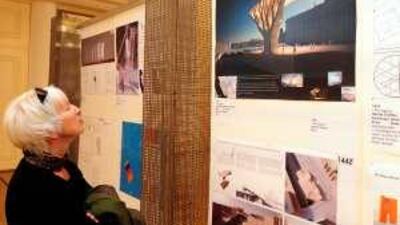BERLIN // A German plan to erect a national unity monument in Berlin is in disarray after a jury scrapped a public competition saying too many of the proposed designs - which included a golden banana, a gigantic shopping trolley and a band of celebrating Smurfs - were "junk".
None of the 538 ideas submitted was deemed suitable for the "Monument to Freedom and Unity" sponsored by the German parliament. Now the jury will invite selected artists to come up with fresh proposals, raising doubts whether it will be able to present the winning design as planned on Nov 9, the 20th anniversary of the fall of the Berlin Wall. Among the more outlandish ideas thrown out by the jurors is a gigantic vase with a German flag sticking in it and a cake shop called "Cafe Deutschland" serving a selection of national cakes, such as Black Forest gâteau. Once a year, on German Unity Day, Oct 3, guests would get a free piece of cake, the proposal states.
The 30-metre gilded banana was intended as a "visible and self-confident expression of the population's individual yearning for freedom," said Hanns Malte Meyer, the architect who devised it. Another design consists of a 19-metre-high German statue of liberty holding a Rubik's Cube painted in the national colours of black, red and gold. All the designs have gone on display in Berlin. One called "Freedom Unity Shopping" envisages a statue of a man pushing a huge shopping trolley containing three balls in the national colours. Another design that did not go down well was a German Imperial-style spiked helmet on top of a tall column.
The Smurf idea - a group of the happy blue dwarfs celebrating on top of a stylised Berlin Wall - produced smiles. More serious ideas included the sculpture of an apple tree as a mark of "German sustainability" and a stretch of the Wall with the words "We Are the People" - the famous East German chant of the 1989 demonstrations - emblazoned in red glowing letters. Critics said the competition was an embarrassment. One member of the jury said many of the designs were "absolute junk" and displayed "disastrous naïveté".
Berliner Zeitung, a local newspaper, wrote: "If the matter weren't so serious, if it weren't such an affair of state, this would be one of the funniest, most delicious exhibitions shown in a long time." Bernd Neumann, the culture minister, a member of the jury, played down the decision to cancel the competition. "The fact that more than 500 ordinary citizens took part in this tender is proof of how involved the Germans are in the nation's affairs," he said. "You can see that many people incorporated the colours of the German flag in their designs. That speaks for itself.
"The fall of the Wall was one of the happiest moments of German history. Commemorating it with a monument is worthy of our country's history." But in typical German fashion, the botched competition has led to a tortured debate about whether it is too soon for such a monument given lingering divisions between east and west, with surveys regularly showing that many easterners feel like second-class citizens and still yearn for the job security of communist times.
In addition, even though more Germans these days profess to be patriotic, the country remains unsure about its national identity given the crimes of the Nazi era. "Auschwitz precludes an unprejudiced look back at the past. The failed competition has once again shown that Germany remains a difficult fatherland," wrote Tagesspiegel, another Berlin daily. Even the planned site of the monument, on a square in front of the former Prussian royal palace in the exact spot where a monument to Emperor Wilhelm I once stood, is deeply controversial. Critics say the location is tainted by Prussian militarism and unsuitable for a monument to democracy and freedom.
Amid all the angst and self-doubt, a survey released two weeks ago offered a ray of light by showing that 59.3 per cent of Germans are proud to be German, significantly more than a decade ago, and 72.9 per cent believe that Germans should show more self-confidence. "After 60 years of actively coming to terms with the past and of deeply felt admissions of guilt, the Germans are ready for a fresh start," said the study conducted by the Identity Foundation, a German think-tank that commissioned two surveys in 2008 and 2009 by the GfK market research institute. "They are starting to forgive themselves, and they no longer despair at their own past."
A new easy-going, good-humoured patriotism was on display during the 2006 World Cup in Germany when millions waved national flags. "There was a new feeling of togetherness, but in the spirit of a street festival, not a street battle," wrote Der Spiegel, the country's leading news magazine. The source of the new-found national pride, the survey showed, is not cultural tradition or history but inventiveness, the Teutonic work ethic, the importance Germans attach to rules and to order, and their love of regional customs.
That restrained, down-to-earth sense of self will make it extremely difficult for the country to come up with a grand national monument accepted by the majority of Germans, critics say. dcrossland@thenational.ae

